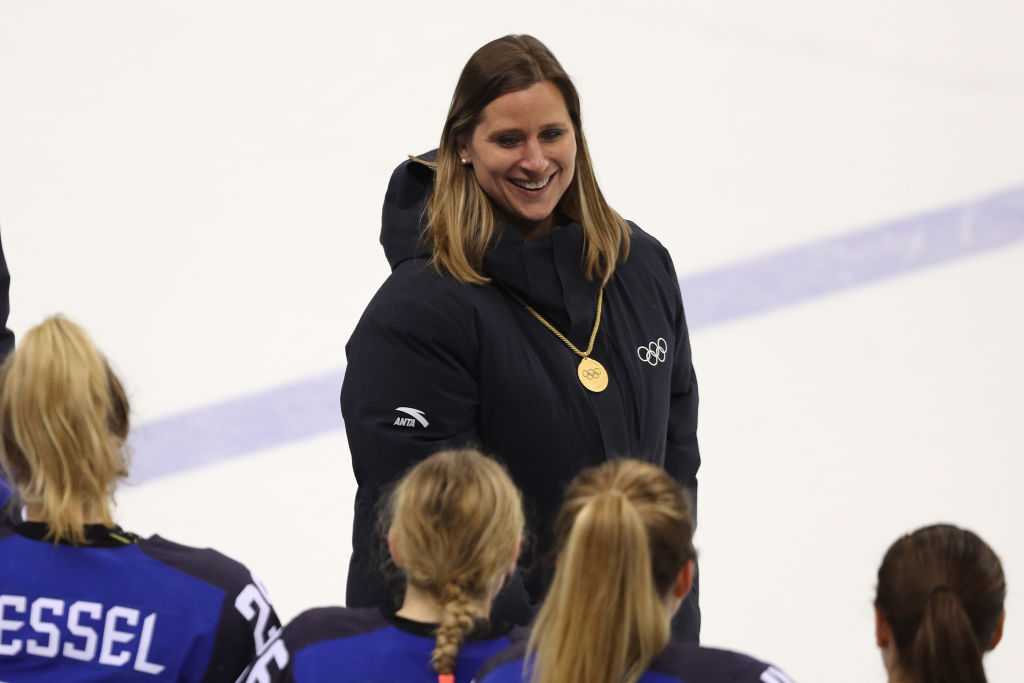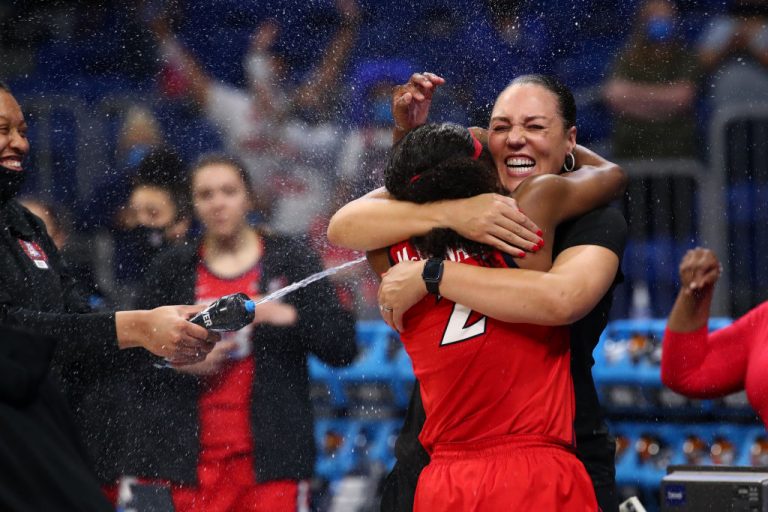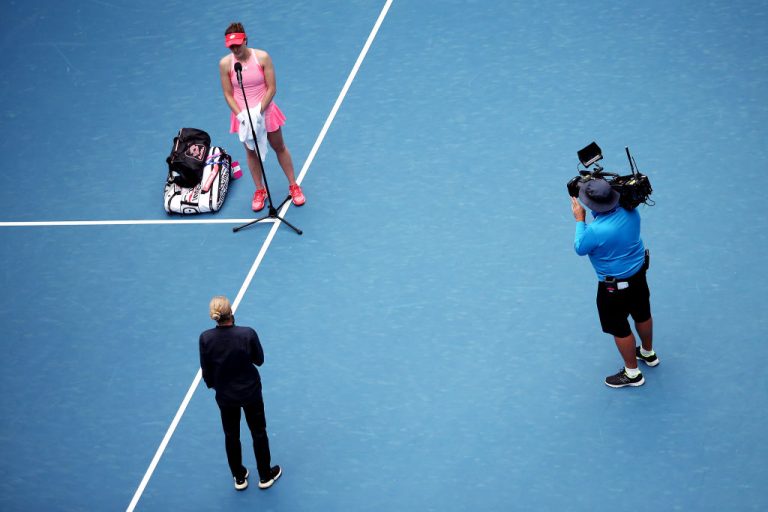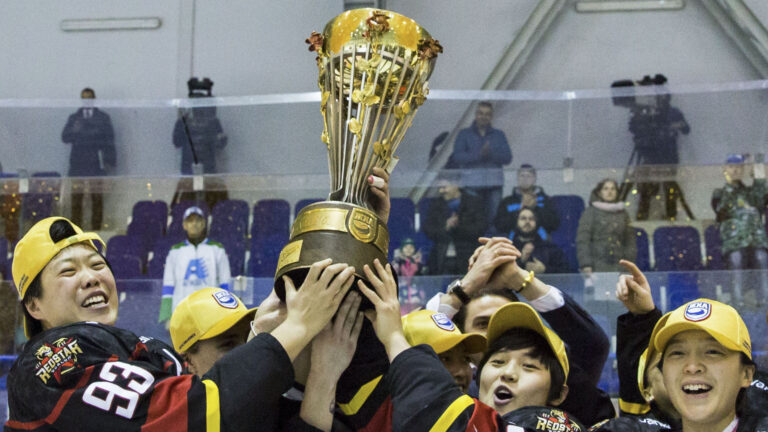After Hockey, Angela Ruggiero Is Charting a Stronger Future for Women’s Sports
Why this matters
Following a decorated hockey career, Angela Ruggiero became a leader in the Olympic movement, pushing for greater gender equality. Today, the gold medalist has co-founded the Sports Innovation Lab, which uses data and research into fan behavior to maximize the business potential of women’s sports.
“I had this eerie sense of accomplishment coming off the ice in Switzerland at my last Worlds when we won the gold medal,” Angela Ruggiero recalls. It was April 25, 2011, at the International Ice Hockey Federation (IIHF) World Championship in Zurich. And the four-time American Olympian – who won gold as an 18-year-old at the inaugural 1998 Olympic women’s hockey tournament in Nagano, Japan – could somehow sense it was time to begin the next phase of her life.
Still, in the afterglow of a 3-2 final overtime victory against arch-rival Canada, Ruggiero didn’t see her path forward as entirely clear. Contemplating retirement at 30 was a challenge for the four-time world champion from California, who had dedicated her life to hockey since age 7.
One of the toughest and most talented defenders in women’s hockey history, Ruggiero had already forged a legacy that would see her inducted into the Hockey Hall of Fame in 2015 – just the fourth woman to claim that distinction – and the IIHF Hockey Hall of Fame in 2017. She could have gone after another gold medal at the 2014 Sochi Olympics.
“Had I been a Zdeno Chara or Tom Brady and making millions, maybe I probably would have kept playing,” Ruggiero says. “But as you know, women’s athletes have a different reality in terms of their checkbooks. So I felt like if I was going to move into the next stage successfully, it’d be better for me to start earlier than later.”
At the time, the former Harvard University captain had no idea what the future would hold. But today at age 41, Ruggiero is a former International Olympic Committee (IOC) member – serving from 2010 to 2018 – and the co-founder of Sports Innovation Lab, which focuses on data-driven market research on trends in sports and monetizing digital fan engagement.
Related: Inspired By USWNT, Cammi Granato Hopes For Sustainable Future For Women’s Hockey
In retrospect, the groundwork had already been laid for Ruggiero’s off-ice reinvention before she officially hung up her skates in December 2011. There were multiple factors. Ruggiero had undergone shoulder surgery to fix a torn labrum after the Vancouver Olympics in 2010. That same year, she completed her master’s degree in sports management at the University of Minnesota. Returning to Harvard for her MBA, which she earned in 2014, was a logical next step.
“You’re trying to figure out who you are in your 20s. In life, everyone is. But as an athlete, you are incentivized and told you should be focused and fixated on the end goal of an Olympics or whatever the championship may be.” - Angela Ruggiero
“The hardest thing is the ‘Who am I?’ question that most athletes struggle with,” Ruggiero says. “You’re trying to figure out who you are in your 20s. In life, everyone is. But as an athlete, you are incentivized and told you should be focused and fixated on the end goal of an Olympics or whatever the championship may be.”
En route to an all-time USA Hockey record – for both women and men – of 256 national team games, Ruggiero found ways to stretch herself professionally and personally. She worked with Right to Play, the non-profit organization that empowers at-risk children worldwide to play sports, and that work took her to Uganda. She had a stint in Boston commercial real estate. She also starred on the sixth season of “The Apprentice” with future U.S. President Donald Trump.
Yet, in a sense, all roads led back to Switzerland. Her 2010 election to the IOC, headquartered in Lausanne, proved a bigger and more rewarding commitment than she’d originally anticipated. In 2011, she joined the IOC Evaluation Commission for the 2018 Winter Games, visiting Annecy (France), Munich (Germany), and the eventual successful candidate city of Pyeongchang (South Korea) while still training for hockey.
“I was a full-time IOC member, very active,” Ruggiero says. “Flying around the world, meeting dignitaries, speaking at the UN, and doing all kinds of amazing things that, in my opinion, were filling my cup, too. How do I do it all? How do I balance everything? Because you want to say yes, put your hand up, take that coffee – and do well in school.”
Putting her eggs in multiple baskets, Ruggiero adds, helped ease what she calls a “really hard transition for athletes.”
“I think I was blessed that I didn’t have the typical lull period where a lot of athletes sit by themselves without a lot of support,” she says. “My approach was, throw more at me so that I’m actively learning but not stewing in my own thoughts.”
Ruggiero ultimately reached the IOC Executive Board (2016-18), serving on numerous commissions that would influence her path with Sports Innovation Lab, including the Athletes Commission and the Digital & Technology Commission. Looking back, the 2018-released Gender Equality Review Project stands out – especially in light of the gender-balanced Tokyo 2020 Games.
“It’s probably my proudest initiative as an IOC member,” Ruggiero says. “It took a long time to understand the system, build the credibility, and handle all the internal politics of getting something massive like this launched. At the time, it wasn’t sexy. Now, everyone is, so to speak, woke to gender equality, or at least aware of being inclusive. But I had to be super careful how I brought it in as the chair of the Athletes Commission.
“The perspective I brought to [IOC President] Thomas Bach was: ‘This is an initiative I’d like to bring in because it’s half the athletes. We should have equal policies, not just across participation but also, for instance, media portrayal. Why are there different rules, different uniforms, different times of events, different venues?’”
Ruggiero long had experienced gaps between how male and female hockey players were treated, from her battle to get ice time in a Michigan “men’s-only” drop-in league after the 1998 Olympics to the hullabaloo surrounding her 2005 debut as the first non-goalie female skater in a North American men’s minor league pro game with the Central Hockey League’s Tulsa Oilers. So it was personal as she leveraged the IOC’s power to facilitate change for other elite women athletes.
“The IOC can’t mandate in certain ways outside of the Olympic Games how the federations act,” Ruggiero says. “But they could initiate a review process, which would bring visibility and awareness to the inequalities that existed in the system and make recommendations on best practices. So we partnered with the Women in Sport Commission to bring this proposal forward, and it was approved. We got unanimous support from the Executive Board. We did a thorough review of the Olympic landscape. It’s definitely one of the key pieces of research that President Bach, I think, should be proud of under his presidency.”
Today, Ruggiero’s Sports Innovation Lab is driving more change by illuminating the ways fans consume and interact with sports in the digital era. The Boston-based firm boasts a wide range of corporate partnerships, including the NHL, NFL, and NASCAR, but it is particularly attuned to maximizing the potential of women’s sports.
In June, it released The Fan Project, an in-depth, data-driven report showing how there is money to be made by investing in women’s sports and employing a “community-based monetization model.” Historically, women’s sports fans have migrated more to the internet because traditional broadcast and print media haven’t served their interests.
Ruggiero touts the concept of the “fluid fan” who engages with leagues and athletes continually on social media platforms and is more attracted to the personalities and social values of athletes than straightforward team-based loyalties and a boatload of statistics for the sake of statistics. She also cites the Netflix series Formula 1: Drive to Survive as a great model in terms of delivering pure storytelling, strong production values, insights into athletes’ personalities, and behind-the-scenes glimpses that attract an audience beyond hardcore Formula 1 auto racing fans.
“We recommend in the report that women’s sports continue to lean more into this kind of content,” she says. “Put it on all these digital and social channels, which is where you’re finding your communities.”
On a personal level, Ruggiero admits it’s impossible to replace the adrenaline rush of playing sports. Yet the woman who won the 2004 Patty Kazmaier Award as college hockey’s top player and scored the 2005 IIHF Women’s World Championship shootout winner against Canada feels fortunate to have found an outlet for her passions in her post-sport journey. She believes that amplifying the commercial viability of women’s sports and making sports in general more diverse and inclusive can lead to greater gender equality overall.
“It’s about how we as a society treat women,” Ruggiero says. “When you look at what I’m doing on paper, it’s like, ‘Oh, you’re this data nerd working on technology.’ But really, what we’re trying to do is use Sports Innovation Lab to break down barriers, which is something I’ve aimed for my whole life. Now I’m just doing it through the business lens.”
Monthly Issue
The Athlete's Journey
If you are what you repeatedly do, what happens when you stop doing it?
The athlete's journey outside of competition is not often covered in media, nor considered all that much by fans. It can, however, be core to athletes’ lived experiences, impacting decisions on where to play, which business opportunities to take, how to take care of their physical and mental health and more.





